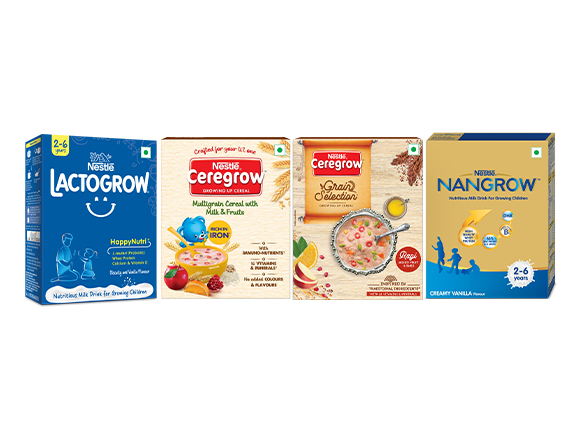Role of nutrition in child development
Nutritional deficiencies in children can affect their overall health. The importance of nutrition in childhood marks the way your child grows up in the coming stages. Introducing nutrient-dense meals in their childhood promotes cognitive health and prevents onset of chronic diseases in later life.
Signs and symptoms of iron deficiency and vitamin D are commonly seen among growing children. In addition, calcium deficiency symptoms in kids are common. Other nutrient deficiency symptoms, like vitamin A and iodine may also occur in children who do not consume a balanced diet.
A balanced diet for your child is the one which provides all the nutrients in required amounts and proper proportions. This can be easily achieved by consuming all the essential nutrients:
a) Carbohydrates from whole wheat chapatti, rice, whole grain bread, whole wheat pasta etc.
b) Proteins from Milk and milk products, pulses and legumes, chicken, eggs, fish etc.
c) Healthy fats like nuts, seeds, vegetable oils, peanut butter, ghee etc.
d) Vitamins and minerals. - Colourful fruits and vegetables.
Given below is a handy chart that describes the symptoms of different nutrient deficiencies and the food sources that need to be included in the diet to overcome them.

Given below is a handy chart that describes the symptoms of different nutrient deficiencies and the food sources that need to be included in the diet to overcome them.
| NUTRIENT | SYMPTOMS OF DEFICIENCY | FOOD SOURCES |
|---|---|---|
|
NUTRIENT
Iron |
SYMPTOMS OF DEFICIENCY
|
FOOD SOURCES
|
|
NUTRIENT
Calcium |
SYMPTOMS OF DEFICIENCY
|
FOOD SOURCES
|
|
NUTRIENT
Vitamin D |
SYMPTOMS OF DEFICIENCY
|
FOOD SOURCES
|
|
NUTRIENT
Vitamin C |
SYMPTOMS OF DEFICIENCY
|
FOOD SOURCES
|
|
NUTRIENT
Vitamin A |
SYMPTOMS OF DEFICIENCY
|
FOOD SOURCES
|
|
NUTRIENT
Iodine |
SYMPTOMS OF DEFICIENCY
|
FOOD SOURCES
|
|
NUTRIENT
Zinc |
SYMPTOMS OF DEFICIENCY
|
FOOD SOURCES
|
The above-mentioned common micronutrient deficiencies can be overcome by ensuring your child consumes a balanced diet that provides all the nutrients in required amounts. In addition, incorporating fortified foods in your child’s daily diet will further help provide the necessary nutrition needed for their growth and development with the appropriate micronutrients.

FREE SAMPLE
Please fill the form to request for a free sample
























